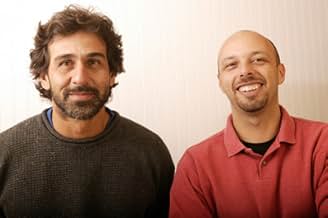AVALIAÇÃO DA IMDb
7,8/10
8,7 mil
SUA AVALIAÇÃO
Em 12 de junho de 2000, um jovem armado tomou os passageiros do ônibus 174 como reféns no Rio de Janeiro, Brasil. Este documentário examina o evento, o frenesi da mídia, a resposta da políci... Ler tudoEm 12 de junho de 2000, um jovem armado tomou os passageiros do ônibus 174 como reféns no Rio de Janeiro, Brasil. Este documentário examina o evento, o frenesi da mídia, a resposta da polícia e os antecedentes do perpetrador.Em 12 de junho de 2000, um jovem armado tomou os passageiros do ônibus 174 como reféns no Rio de Janeiro, Brasil. Este documentário examina o evento, o frenesi da mídia, a resposta da polícia e os antecedentes do perpetrador.
- Prêmios
- 21 vitórias e 9 indicações no total
Sandro do Nascimento
- Self
- (cenas de arquivo)
Geísa Firmo Gonçalves
- Self
- (cenas de arquivo)
- Direção
- Roteiristas
- Elenco e equipe completos
- Produção, bilheteria e muito mais no IMDbPro
Enredo
Você sabia?
- CuriosidadesIncluded among the 1,001 Movies You Must See (Before You Die) (2014), edited by Steven Schneider.
- ConexõesFeatured in 50 Documentaries to See Before You Die: Episode 4 (2011)
Avaliação em destaque
On June 12, 2000 Sandro de Nascimento stepped onto a bus in Rio de Jeneiro, brandished a handgun and demanded money from its patrons. It was just another day in Rio. Well, it was, until an unnecessarily prompt response time by police turned the simple robbery into a complex hostage situation destined to be botched through incompetence. Toss in virtually unrestricted media coverage throughout the five-hour ordeal and what followed was a sequence of dramatized misfortunes to rival the wet dreams of any reality TV producer.
Bus 174, is a documentary by Jose Padilha, focusing on the "how's" and "why's" of the avoidable tragedy that was this day-long fiasco. Relying heavily on in-your-face news footage that was broadcast live to Brazilians around the country; as well as in-depth interviews with hostages, police officers and friends and family of Sandro, Padilha inter-cuts the events of June 12 with the story of Sandro's life as a doomed street kid shunned from society. In so doing, Padilha addresses that age-old ideological argument of nurture vs nature. Did Sandro instigate the events leading to this tragedy of police incompetence simply because it was bread into him? Or might there be more to the story? Had he believed the former, Padihla would have had a much shorter film on his hands. Fortunately for us though, he chose to go against the teachings from the "school of Bush", painting the scenario, not in black and white, but in a muddled gray.
And so we are told the story of a child who, after witnessing the brutal murder of his mother at the age of 5, was destined for a life on the streets where crime is simply a means of survival. We are told of the socio-economical issues in Brazil, where its class system has divided the nation to a point where rich ignore the poor (unless it's to drop slabs of rock on their heads while they sleep). We are told of a government whose brutal attitude towards street kids helped instigate the Candelaria massacres (where Sandro again got to witness the slaying of the people he called family). And we are told of a penal system so inhumane and violent, people would rather die then go to jail. What we are told is that violence begets violence.
As manipulative and subjective as some documentary film-making can be, it is often easy for critics to discredit a film like this as being socialist propaganda (just ask Michael Moore). But it is to Padihla's credit that he is able to avoid this by simply presenting us with the information he has acquired. We are not force-fed opinions and told what to believe, nor is Sandro portrayed as some sort of martyr for equal-rights, we are simply given the full story and are then left to draw our own conclusions.
Because what some may see as black and white, the rest of us see as shades of gray -Shaun English
Bus 174, is a documentary by Jose Padilha, focusing on the "how's" and "why's" of the avoidable tragedy that was this day-long fiasco. Relying heavily on in-your-face news footage that was broadcast live to Brazilians around the country; as well as in-depth interviews with hostages, police officers and friends and family of Sandro, Padilha inter-cuts the events of June 12 with the story of Sandro's life as a doomed street kid shunned from society. In so doing, Padilha addresses that age-old ideological argument of nurture vs nature. Did Sandro instigate the events leading to this tragedy of police incompetence simply because it was bread into him? Or might there be more to the story? Had he believed the former, Padihla would have had a much shorter film on his hands. Fortunately for us though, he chose to go against the teachings from the "school of Bush", painting the scenario, not in black and white, but in a muddled gray.
And so we are told the story of a child who, after witnessing the brutal murder of his mother at the age of 5, was destined for a life on the streets where crime is simply a means of survival. We are told of the socio-economical issues in Brazil, where its class system has divided the nation to a point where rich ignore the poor (unless it's to drop slabs of rock on their heads while they sleep). We are told of a government whose brutal attitude towards street kids helped instigate the Candelaria massacres (where Sandro again got to witness the slaying of the people he called family). And we are told of a penal system so inhumane and violent, people would rather die then go to jail. What we are told is that violence begets violence.
As manipulative and subjective as some documentary film-making can be, it is often easy for critics to discredit a film like this as being socialist propaganda (just ask Michael Moore). But it is to Padihla's credit that he is able to avoid this by simply presenting us with the information he has acquired. We are not force-fed opinions and told what to believe, nor is Sandro portrayed as some sort of martyr for equal-rights, we are simply given the full story and are then left to draw our own conclusions.
Because what some may see as black and white, the rest of us see as shades of gray -Shaun English
- canisminor_
- 27 de mai. de 2005
- Link permanente
Principais escolhas
Faça login para avaliar e ver a lista de recomendações personalizadas
- How long is Bus 174?Fornecido pela Alexa
Detalhes
Bilheteria
- Faturamento bruto nos EUA e Canadá
- US$ 217.201
- Fim de semana de estreia nos EUA e Canadá
- US$ 8.625
- 12 de out. de 2003
- Faturamento bruto mundial
- US$ 222.506
- Tempo de duração2 horas 30 minutos
- Cor
- Mixagem de som
- Proporção
- 1.85 : 1
Contribua para esta página
Sugerir uma alteração ou adicionar conteúdo ausente






















